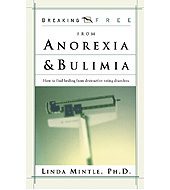When Demi Moore was hospitalized yesterday, my first therapeutic instinct was to wonder about an eating disorder. I have treated people with eating disorders for over 25 years.
While Moore has not confirmed or denied an eating disorder, a growing number of women in their 40s and 50s are seeking help for midlife eating disorders. In part, this age group struggles with aging in a culture obsessed with youth and fitness. The fears of a changing physical body, launching children into the world, and marital breakups can trigger an obsession with food, weight and exercise. If a person copes with life changes and losses though food and overexercising, an eating disorder can develop. Furthermore, if a woman had eating issues in her youth and was never completely treated for them or failed treatment, they can re-emerge at mid life.
Eating disorders in mid life create health problems–some serious enough to lead to death. Osteoporosis, cardiac concerns, thinning hair, skin bruising, tooth decay, and gastrointestinal complaints are just a few dangers associated with self-starvation and/or binging and purging.
Moore’s comments in an interviews with Harper’s Bazaar reveal a woman who has struggled with body image for years. She appears to have lost weight and doesn’t look well. The stress of the breakup could have been a tipping point.
When asked about her deepest fear, she replied,
“If I were to answer it just kind of bold-faced, I would say what scares me is that I’m going to ultimately find out at the end of my life that I’m really not lovable, that I’m not worthy of being loved. That there’s something fundamentally wrong with me. …
People with eating disorders feel they are not worthy of love; that if people really knew them, they would be unlovable.
She goes on to say,
“What scares me the most is not knowing and accepting that just about everything is not in my control. That makes me feel unsafe.”
Control is a central issue for someone with an eating disorder. A woman who can’t control what is happening in her life resorts to over control of the body (anorexia) or losing control and trying to regain it (bulimia).
Moore’s representative also reported symptoms of exhaustion, also common to someone with an eating disorder.
And there is talk that she is being treated for substance abuse as well (People Magazine reported she battled this in 1996)–another common co-factor in bulimia.
So while we don’t know the real reason for her collapse, this incident may bring awareness to the growing number of middle age women who are developing eating disorders in mid life.
I am glad Ms. Moore is hospitalized. She needs to get rest and be treated for whatever is at the root of her collapse. If it is an eating disorder, then professional treatment is needed.
For more help and understanding about eating disorders and treatment:



